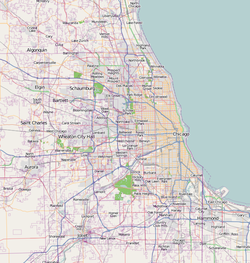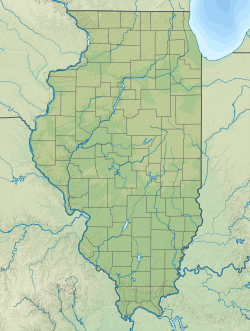Richton Park, Illinois
Richton Park, Illinois | |
|---|---|
 Richton Park welcome sign | |
| Motto(s): "Proud Past; Bright Future" | |
 Location of Richton Park in Cook County, Illinois. | |
| Coordinates: 41°28′55″N 87°43′31″W / 41.48194°N 87.72528°W | |
| Country | United States |
| State | Illinois |
| County | Cook |
| Township | Rich |
| Area | |
• Total | 4.40 sq mi (11.41 km2) |
| • Land | 4.39 sq mi (11.37 km2) |
| • Water | 0.01 sq mi (0.03 km2) |
| Population (2020) | |
• Total | 12,775 |
| • Density | 2,908.70/sq mi (1,123.08/km2) |
| Time zone | UTC-6 (CST) |
| • Summer (DST) | UTC-5 (CDT) |
| ZIP Code(s) | 60471, 60443 |
| Area code | 708 |
| FIPS code | 17-63706 |
| Website | www |
Richton Park is a village and south suburb of Chicago in Cook County, Illinois, United States. The population was 12,775 at the 2020 census.[2]
History
[edit]Richton Park sits along the Sauk Trail, a major trail used by the several Native American tribes for travel. By the 1840s German migrants settled in the area and created a small farming community.
The village was named after a Richton in Vermont, the native home of a first settler.[3]
On the evening of June 7, 2008, an EF2 tornado went through portions of Richton Park, damaging homes and businesses.[4]
Geography
[edit]Richton Park is located at 41°28′55″N 87°43′31″W / 41.48194°N 87.72528°W (41.481992, -87.725352).[5]
The village is bordered by Matteson to the north, Park Forest to the east, and University Park to the south.
According to the 2021 census gazetteer files, Richton Park has a total area of 4.40 square miles (11.40 km2), of which 4.39 square miles (11.37 km2) (or 99.73%) is land and 0.01 square miles (0.03 km2) (or 0.27%) is water.[6]
Demographics
[edit]| Census | Pop. | Note | %± |
|---|---|---|---|
| 1930 | 137 | — | |
| 1940 | 107 | −21.9% | |
| 1950 | 232 | 116.8% | |
| 1960 | 933 | 302.2% | |
| 1970 | 2,558 | 174.2% | |
| 1980 | 9,403 | 267.6% | |
| 1990 | 10,523 | 11.9% | |
| 2000 | 12,533 | 19.1% | |
| 2010 | 13,646 | 8.9% | |
| 2020 | 12,775 | −6.4% | |
| U.S. Decennial Census[7] 2010[8] 2020[9] | |||
As of the 2020 census[10] there were 12,775 people, 5,244 households, and 3,298 families residing in the village. The population density was 2,900.77 inhabitants per square mile (1,119.99/km2). There were 5,487 housing units at an average density of 1,245.91 per square mile (481.05/km2). The racial makeup of the village was 6.64% White, 86.61% African American, 0.28% Native American, 0.78% Asian, 0.01% Pacific Islander, 1.80% from other races, and 3.87% from two or more races. Hispanic or Latino of any race were 4.24% of the population.
There were 5,244 households, out of which 25.6% had children under the age of 18 living with them, 36.78% were married couples living together, 20.50% had a female householder with no husband present, and 37.11% were non-families. 35.87% of all households were made up of individuals, and 15.24% had someone living alone who was 65 years of age or older. The average household size was 3.32 and the average family size was 2.52.
The village's age distribution consisted of 19.6% under the age of 18, 14.8% from 18 to 24, 20.1% from 25 to 44, 32% from 45 to 64, and 13.6% who were 65 years of age or older. The median age was 42.1 years. For every 100 females, there were 94.5 males. For every 100 females age 18 and over, there were 87.4 males.
The median income for a household in the village was $63,777, and the median income for a family was $82,208. Males had a median income of $49,393 versus $43,399 for females. The per capita income for the village was $28,756. About 8.3% of families and 11.4% of the population were below the poverty line, including 8.6% of those under age 18 and 25.1% of those age 65 or over.
| Race / Ethnicity (NH = Non-Hispanic) | Pop 2000[11] | Pop 2010[8] | Pop 2020[9] | % 2000 | % 2010 | % 2020 |
|---|---|---|---|---|---|---|
| White alone (NH) | 4,232 | 1,543 | 804 | 33.77% | 11.31% | 6.29% |
| Black or African American alone (NH) | 7,374 | 11,156 | 10,988 | 58.84% | 81.75% | 86.01% |
| Native American or Alaska Native alone (NH) | 26 | 12 | 21 | 0.21% | 0.09% | 0.16% |
| Asian alone (NH) | 188 | 136 | 94 | 1.50% | 1.00% | 0.74% |
| Pacific Islander alone (NH) | 4 | 8 | 1 | 0.03% | 0.06% | 0.01% |
| Other race alone (NH) | 25 | 19 | 34 | 0.20% | 0.14% | 0.27% |
| Mixed race or Multiracial (NH) | 200 | 295 | 291 | 1.60% | 2.16% | 2.28% |
| Hispanic or Latino (any race) | 484 | 477 | 542 | 3.86% | 3.50% | 4.24% |
| Total | 12,533 | 13,646 | 12,775 | 100.00% | 100.00% | 100.00% |
Education
[edit]Matteson School District 162 is headquartered in Richton Park and serves portions of the village.[12]
Elementary School District 159 serves portions of Richton Park.
- Neil A. Armstrong School [3]
Rich Township High School Fine Arts and Communications Campus and Southland College Preparatory Charter High School are the two public high schools that serve Richton Park, both schools are located in the village.
The Richton Park Public Library District has served the village since 1972.
Transportation
[edit]The Richton Park station provides Metra commuter rail service along the Metra Electric District. Trains travel north to Millennium station in Chicago, and south to University Park station.[13]
Notable places
[edit]- Rich City Skate (Formerly Olympic Skate World) - Featured in the HBO documentary United Skates, highlighting African American roller skating rinks.
Government
[edit]Richton Park is in Illinois's 2nd congressional district.
References
[edit]- ^ "2020 U.S. Gazetteer Files". United States Census Bureau. Retrieved March 15, 2022.
- ^ "Quick factS: Richton Park village, Illinois". U.S. Census Bureau. Retrieved October 4, 2021.
- ^ Illinois Central Magazine. Illinois Central Railroad Company. 1922. p. 45.
- ^ "June 7, 2008 Severe Weather Event".
- ^ "US Gazetteer files: 2010, 2000, and 1990". United States Census Bureau. February 12, 2011. Retrieved April 23, 2011.
- ^ Bureau, US Census. "Gazetteer Files". Census.gov. Retrieved June 29, 2022.
{{cite web}}:|last=has generic name (help) - ^ "Decennial Census of Population and Housing by Decades". US Census Bureau.
- ^ a b "P2 Hispanic or Latino, and Not Hispanic or Latino by Race – 2010: DEC Redistricting Data (PL 94-171) – Richton Park village, Illinois". United States Census Bureau.
- ^ a b "P2 Hispanic or Latino, and Not Hispanic or Latino by Race – 2020: DEC Redistricting Data (PL 94-171) – Richton Park village, Illinois". United States Census Bureau.
- ^ "Explore Census Data". data.census.gov. Retrieved June 28, 2022.
- ^ "P004: Hispanic or Latino, and Not Hispanic or Latino by Race – 2000: DEC Summary File 1 – Richton Park village, Illinois". United States Census Bureau.
- ^ "Home page Archived 2013-04-15 at archive.today. Matteson School District 162. Retrieved on December 8, 2012. "4601 Sauk Trail, Richton Park, IL 60471"
- ^ "RTA System Map" (PDF). Retrieved February 1, 2024.





